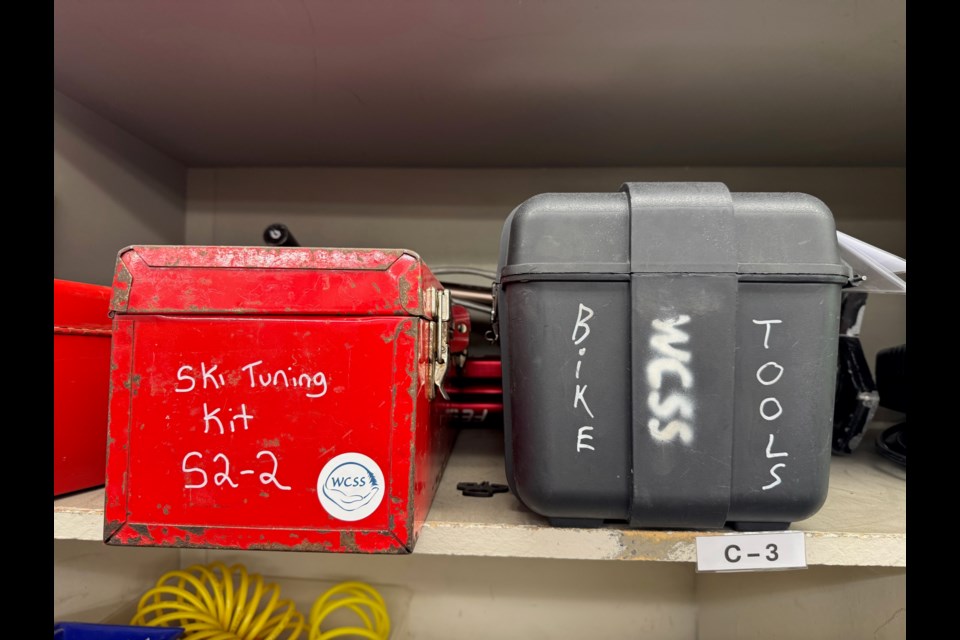Why buy when you can borrow? Whistler’s Tool Lending Library is proving in a town where space and money are tight, sharing really is caring.
Thanks to ongoing support from the Whistler Blackcomb Foundation and its Enviro Fund, the Whistler Community Services Society (WCSS) and the Re-Build-It Centre have grown the program into a hub for locals who want to build, repair, garden—or just get a project done—without purchasing a garage full of tools.
“This is a really important grant for us to receive,” said Jackie Dickinson, executive director of WCSS. “It ensures we’re able to raise awareness about the program, explain what’s happening in the community, and get tools into the hands of people who need them.”
The Foundation provided funds for promotion, marketing and materials for the Tool Lending Library. It also helped purchase the recognizable truck that zips around town collecting refundable recyclables—another WCSS initiative aimed at sustainability and community reinvestment.
Marketing support may not sound glamorous, but Dickinson said it’s essential: “It’s really tough in a non-profit climate to focus on raising awareness. But when people say, ‘I wish I had known about this a year ago,’ that really hurts my heart.”
The Tool Lending Library, located inside the Re-Build-It Centre in Function Junction, operates like a traditional library—just swap out books for drills, table saws, and even ski-tuning kits. Membership costs $75 annually for individuals or $100 for two people sharing an account. Members can borrow from more than 1,000 tools, from screwdrivers to routers, air compressors and even planers.
Tobias Ross, assistant manager of the Re-Use-It Centre and the library’s de facto tool wrangler, said the goal is to keep it as accessible as possible.
“Everything else is going up in price, so we wanted to make this affordable for people who still want to do fun projects and make improvements,” he said.
With more than 280 active members, Ross said the most common users are those who rent or live in tight quarters.
“They don’t have garages or space to store everything," he said. "This way, they’re saving money, saving space, and reducing waste.”
That’s exactly how Dickinson and her family use the program.
“We live in a small space with no storage. Having access to tools has supported our community garden and saved us from buying things we don’t need long-term,” she said. “It’s a fun way to grow food, support community, and rethink how we build and live.”
That shift in thinking seems to ripple out. “When we got a membership, neighbours started asking about it, too," Dickinson said. "They realized they didn’t need to buy and store all these things either.”
Ross shared one memorable example: a local who borrowed tools over several months to refurbish an old van into a camper. “He was in and out of the centre constantly, and the finished van was a beautiful piece of work.”
The tool library’s other unsung hero is the Re-Use-It truck. Funded in part by the Foundation, it services about 40 locations across Whistler—stretching from Cheakamus to Nicklaus North—picking up refundable containers like soda cans and milk jugs.
“The money goes right back into WCSS programs,” said Ross. “It’s simple, it’s sustainable, and it supports community.”
While members are expected to know how to use the tools—“we can’t offer training for insurance reasons,” Ross explained—the library does keep tools in good working order, with batteries charged and accessories like blades and sandpaper regularly replaced.
That behind-the-scenes maintenance helps people focus on the task at hand, whether it’s building a fence, fixing a bike, or tuning up their skis.
Dickinson said the value extends far beyond the practical.
“It changes how we think about construction, development and waste," she said. "It encourages borrowing instead of buying, collaboration instead of consumption.”




